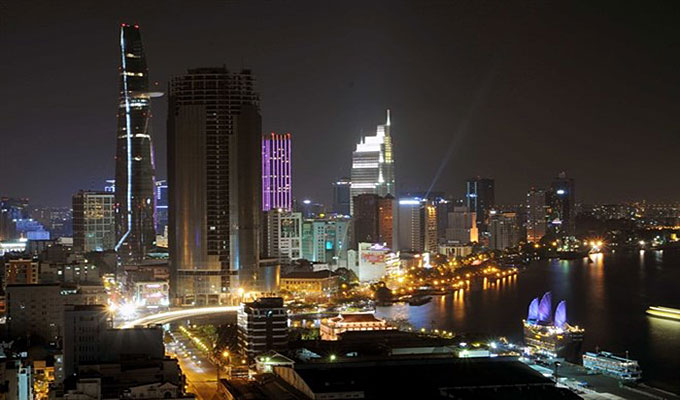New York, famously known as the “city that never sleeps,” will soon be joined by Ho Chi Minh City, which is aspiring to that status in an effort to step up its tourism game.

The city, formerly known as Sai Gon and the “Pearl of the Orient” in the early 20th century, receives an average of 400,000 foreign tourists each month, generating revenues of thousands of billions of VND, but some experts said it lacks night attractions that meet the demands of tourists looking to explore the city’s night life.
La Quoc Khanh, Deputy Director of the National Department of Tourism, said his office has found a real need among tourists to stay up late and explore the local night life.
“Some 30-40 percent of national and international tourists want to go out after midnight, as well as 60-70 percent of local citizens,” he told the Tuoi Tre newspaper, adding that the majority of foreign tourists typically suffer jet lag due to time differences and can only fall asleep after 2-3am.
“Only some 10 percent of guests at motels in central areas of the city get back before midnight, most of them are elderly,” he said.
To turn tourism into a spearhead economy for city, a conference on developing the industry was held recently by the HCM City Party Committee. Attending the meeting were senior city officials, representatives of travel agencies and tourism experts.
Vo Anh Tai, deputy director of tour operator Saigontourist, said the city’s lack of night tourist attractions was one of the factors weighing the industry down.
“Even though we provide a variety of sightseeing tours during the day, the city’s tourism scene at night is considered by many tourists to be rather monotonous and lacking cultural authenticity,” he said.
“We need to give tourists the impression that HCM City is a city that never sleeps by developing more night entertainment activities, festivals, large-scale shopping centres, and holding at least one major event per month," he said.
Despite being the few places in the city where foreign tourists can hang out at night, there are curfews on the majority of restaurants and clubs, including the Bui Vien ’Western Street,’ said Vo Tran Quoc Thang, a city resident.
"After leaving the restaurants at 11pm, my foreign friends and I like having a second round at the Western Street, but establishments on the street are often not allowed to open that late," he said.
"There was a time when we were watching a street performance, the artists had to get up and run in the middle of the show, because they were shooed away by the city’s guards," he added. "It wasn’t a pleasant sight at all."
In contrast to the locals’ eagerness to make HCM City more entertaining, some foreign tourists are fine with what it can offer at the moment.
Anthony Griffiths, a Canadian tourist who visited the city last year, said he enjoyed the local food, clubs, beer, markets. "Great street food. Not many, but nice clubs," he said.
"I don’t think the city - and Viet Nam in general - needs to develop more tourist attractions, because it will lose its identity when it is commercialised," he said.
How to manage the ‘never sleep’ areas is a major concern for both authorities and citizens.
Phan Thanh Dat, an illustrator living in the city, supports the idea, but said that the parts that ‘never sleep’ should be managed carefully so that they would not affect the residential areas.
“I’m living next to a commercial complex consisting of several restaurants, pubs and karaoke parlours, which constantly causes traffic congestions and exhausts neighbours with noise,” he said.
“I’m really concerned about where the authorities are planning to develop these ‘never sleep’ areas,” he said.
Khanh said these areas would not be limited to downtown District 1 alone.
The ‘Western Street’ model on Bui Vien Street can be replicated on Hai Ba Trung Street (also in District 1) and Chau Van Liem Street in District 5, he said.
Businesses operating on these streets would have to register with the city (to remain open throughout the night), he added.
The city’s regulations would need to be changed in order for the idea to be effective, while still ensuring urban order, he added.
He proposed that major restaurants and hotels of 3-5 star status should be allowed to operate after midnight upon request. "Many of them have real need to do so, but aren’t allowed by current regulations," he said.
The process of actualising the idea must be planned carefully without rush, he added.
The areas identified would have to meet certain standards, and new regulations on types of services that businesses can offer in these areas must be regulated carefully, Khanh said.